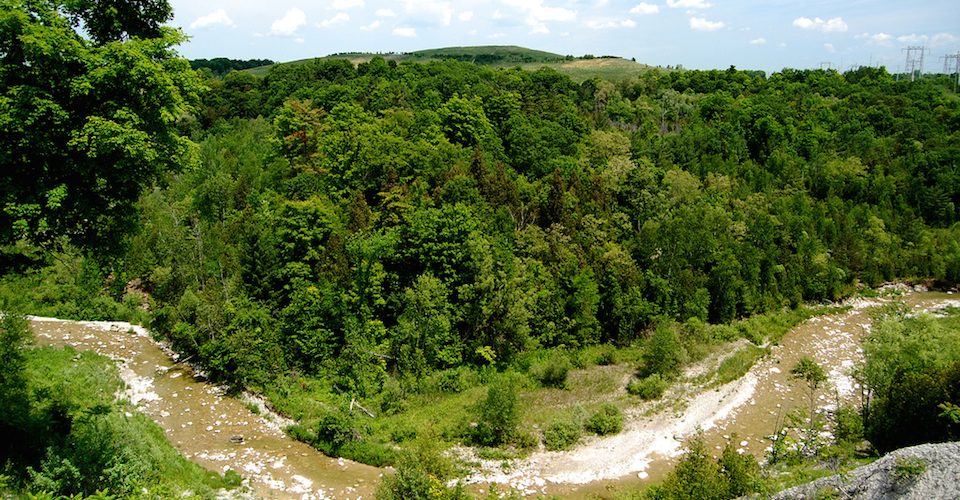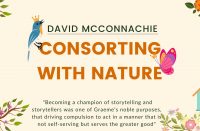On a media tour this week of the proposed park on Toronto’s eastern boundary, federal NDP environment critic Megan Leslie (Halifax) told reporters she will advise her caucus to oppose government Bill C-40 despite the personal difficulty she feels in opposing the park.
“I’m in a parallel universe where I get applause for voting against creating a park,” Leslie told a small gathering of environmental stakeholders and media at Hillside Outdoor Education School, located inside the 58-square-km Rouge National Urban Park study area.
On a media tour this week of the proposed park on Toronto’s eastern boundary, federal NDP environment critic Megan Leslie (Halifax) told reporters she will advise her caucus to oppose government Bill C-40 despite the personal difficulty she feels in opposing the park.
“I’m in a parallel universe where I get applause for voting against creating a park,” Leslie told a small gathering of environmental stakeholders and media at Hillside Outdoor Education School, located inside the 58-square-km Rouge National Urban Park study area.
After raising concerns with the lack of ecological protections offered in Bill C-40 from Stephen Harper’s Conservative government, this summer Leslie advised her caucus to support the bill at second reading, hoping to make changes in committee.
But it wasn’t to be. The government didn’t bring a single amendment to the Environment Committee debating C-40 on November 5. And opposition amendments from the New Democrats, Liberals and Greens were all rejected by the majority Conservatives who hold the balance of power.
“Everybody was reasonable at committee,” Leslie told reporters this week during her first visit to the park she’s defending in parliament. Farmers and environmentalist alike were willing to work with the government to tweak various aspects of the bill to bolster ecological protection and ensure farmland wasn’t handed over to housing developers. Yet the Tories weren’t interested.
The government wants to paint this as a fight between farmers and environmentalists, but it’s simply not true.
The government wants to paint this as a fight between farmers and environmentalists, Leslie said, but it’s simply not true. “It’s a false tension that’s created by the Conservatives because … it makes it more convenient if they can just steamroll through.”
Leslie’s not alone in her frustration. In an op-ed this week, Green MP Bruce Hyer (Thunder Bay–Superior North) called the government’s actions in committee a “virus of mindless tribalism,” the same herd mentality that has taken over Question Period.
“Most of the Conservatives did not even look up during the debate,” Hyer wrote, “keeping their eyes glued on their Blackberrys as they stubbornly refused every bipartisan attempt to improve ecological protection in the park.”
Without managing to improve the bill in committee, Leslie told reporters she now faces the difficult choice of recommending against a bill creating a park in a part of Canada badly in need of dedicated parkland.
“I think we’re going to have to” vote against it, Leslie said. “Talking to stakeholders who are here today, realizing what a precedent this could set for other parks across Canada, I think it’s where we are going to fall. That recommendation will come later this week.”
What worries Leslie and environmental groups alike is the flimsy commitment to protect the ecological integrity of the park the Tories have written into the bill. While legislation governing other national parks in Canada say the Minister of the Environment has to protect the park’s ecology, Bill C-40 says the Minister must “take into consideration the protection of its natural ecosystems.” The distinction is slim, but significant.
In September, the Ontario government — which owns two-thirds of the land to become part of the park — signalled their refusal to hand over any land unless the Tories make a move to address the concerns of environmental groups and opposition MPs.
A more robust legislative framework is needed to ensure Canada’s first urban national park will adequately protect the Rouge — an amazing national treasure.
This week, a coalition of six of the country’s top environmental NGOs including the David Suzuki Foundation, Environmental Defence and Nature Canada penned an open letter to all members of parliament calling on them to reject C-40.
“A more robust legislative framework is needed to ensure Canada’s first urban national park will adequately protect the Rouge – an amazing national treasure – for Canadians today and into the future,” the letter states. And without the Ontario government lands in the mix, the Tories risk creating a park “in name only.”
For Jim Robb, general manager of Friends of the Rouge Watershed, this is nothing but greenwashing. The Tories are looking for “green” legislation to point to in the 2015 federal election to deflect attention away from their abysmal environmental record, Robb told reporters on the media tour this week.
His group released their top ten concerns with the proposed legislation: everything from the failure to protect ecological integrity to keeping more than 60 per cent of the park lands off limits in taxpayer-subsidized farming leases.
Yet Robb holds out that if the Conservatives are sincere about creating a badly-needed park and move to strengthen the legislation, this would be an “amazing initiative” on their part. “If they do the right thing on this, which they haven’t thus far, bringing nature to urban areas and transit accessible areas is a really important thing for our future.”
Andrew Reeves is the Editor-in-Chief of Alternatives Journal. Overrun, his book about Asian carp in North America, will be published in Spring 2019 by ECW Press. His work has also appeared in the Globe & Mail, Spacing and Corporate Knights. Follow him on Twitter.













